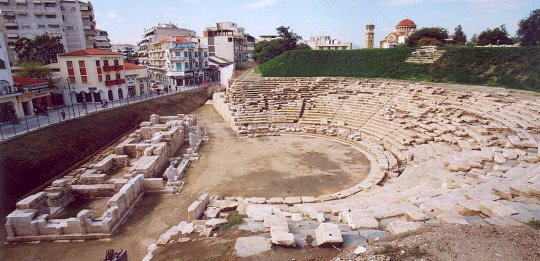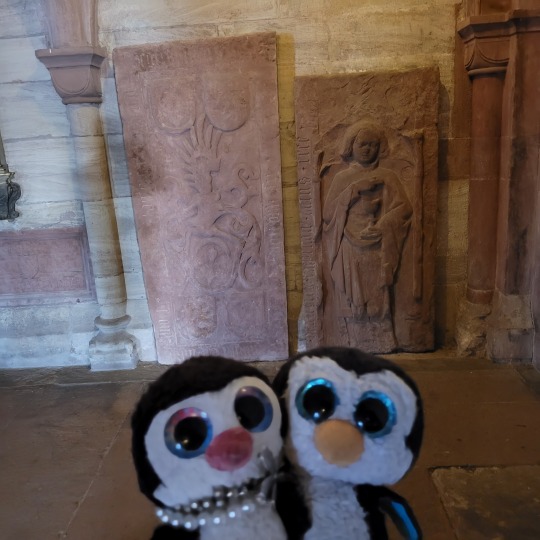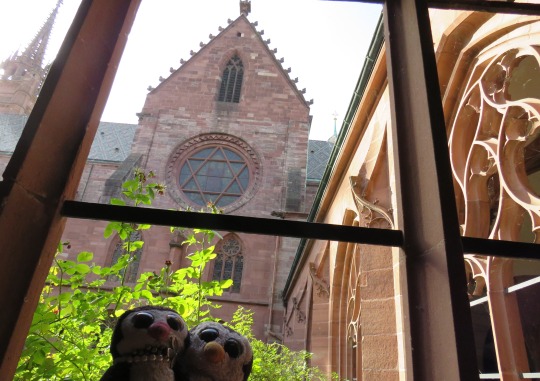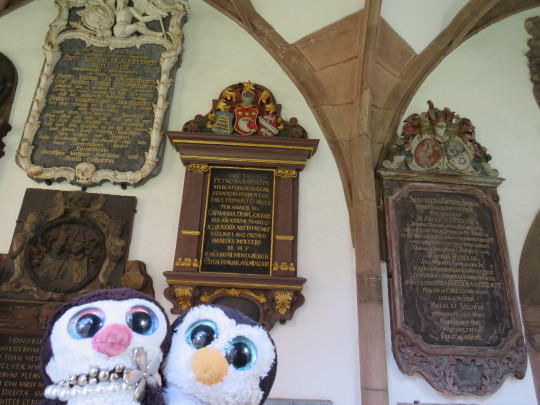#αρχαίου
Text
Η ιστορία του μεγαλειώδους Αρχαίου Θέατρου της Λάρισας που κάποτε υπήρξε και χώρος συνεδριάσεων του «Κοινού των Θεσσαλών» (φωτό
Η ιστορία του μεγαλειώδους Αρχαίου Θέατρου της Λάρισας που κάποτε υπήρξε και χώρος συνεδριάσεων του «Κοινού των Θεσσαλών» (φωτό
Το μεγαλειώδες Α’ αρχαίο θέατρο της πόλης κατασκευάστηκε στις νότιες υπώρειες του λόφου «Φρούριο», όπου βρισκόταν οχυρωμένη η αρχαία ακρόπολη και είχε προσανατολισμό προς νότο, προς τη λεγόμενη ελεύθερη αρχαία αγορά η οποία σύμφωνα με ασφαλείς αρχαιολογικές ενδείξεις τοποθετείται στο κέντρο της σημερινής πόλης.
Είχε διάρκεια ζωής έξι αιώνων περίπου από τις αρχές του 3ου οι. π. Χ. μέχρι το τέλος…

View On WordPress
#Αρχαίου#Θεάτρου#Θεσσαλών#ιστορία#και#Κάποτε#κοινού#Λάρισας#μεγαλειώδους#που#συνεδριάσεων#της#τον#του#υπήρξε#φωτό#χορός
0 notes
Text
Αρχαίο DNA: Τι αποκαλύπτει για την ιστορία της Ελλάδας, της Νότιας Ευρώπης και της Ανατολίας
Αρχαίο DNA: Τι αποκαλύπτει για την ιστορία της Ελλάδας, της Νότιας Ευρώπης και της Ανατολίας
Τρεις νέες επιστημονικές μελέτες αρχαίου DNA, με τη συμμετοχή πολλών Ελλήνων επιστημόνων και επικεφαλής έναν Έλληνα της διασποράς, παρουσιάζουν την πιο ολοκληρωμένη μέχρι σήμερα παλαιογενετική ιστορία του λεγόμενου Νότιου Τόξου, της περιοχής που θεωρείται το «λίκνο του Δυτικού πολιτισμού» και η οποία περιλαμβάνει την Ελλάδα, εκτεινόμενη από τη Νοτιοανατολική Ευρώπη και τη Μαύρη Θάλασσα μέχρι την…
View On WordPress
0 notes
Text
"Αίμα, δάκρυα κι ιδρώτας": Γιατί να μελετάμε τα αρχαία ελληνικά;
[Ομιλία προς τους μαθητές της Αγγλικής Σχολής Λευκωσίας, που εκφωνήθηκε στις 19 Ιανουαρίου 2023, στο πλαίσιο Ημερίδας Αρχαίων Ελληνικών, που διοργάνωσε το σχολείο. Ευχαριστώ τη φίλη και συνάδελφο Εύα Πολυβίου για την πρόσκληση]
Το 2017, η πακιστανικής καταγωγής Βρετανίδα μυθιστοριογράφος Καμίλα Σάμσι δημοσίευσε το μυθιστόρημα Home Fire, που στα ελληνικά μεταφράστηκε μάλλον αδόκιμα ως Κρυφή…

View On WordPress
#Home Fire#Αντιγόνη#αρχαία Ελλάδα#αρχαία ελληνικά#αξία και σημασία της μελέτης του αρχαίου κόσμου#επιβίωση του αρχαίου κόσμου#Kamila Shamsie
0 notes
Text
TIL from a podcast featuring historian and Byzantine archaeologist Yannis Theoharis:
Athens was one of the most religiously conservative cities of the Byzantine Empire. It adhered to the ancient Greek religion for longer than most other areas. Contrary to popular belief, its eventual conversion to Christianity did not happen violently. Christianity was getting more and more ground amongst the believers progressively. Meanwhile, the ancient temples and shrines were progressively emptying but as long as there were believers they were functioning properly and had guards and went through restoration works and all, as stated by Neoplatonic philosopher Proklos (with the exception of nude sculptures which had been destroyed already by proto-Christians). The historian also claims the conversion of the temples to churches happened later than what was previously believed, around the 7th-9th centuries. As the vast majority of the population had eventually converted to Christianity, the temples were left abandoned. The empire ordered their conversion to churches so that funding their preservation could be justified. Furthermore, there wasn’t as much of violent banning of ancient schools as it was thought. Justinian did not ban the function of the Neoplatonic school in Athens but ceased the state funding unless the school accepted to add Christian theology to its curriculum. The Neoplatonic school refused but it was not banned. It kept functioning using its own private funds until this wasn’t enough and the school had to close. Evidence for this is that it is documented that the school functioned for several decades or more than a century (don’t remember exactly) after Justinian’s imperial command, which was previously viewed as an immediate or violent shutdown. Meanwhile, the Neoplatonic school in Alexandria (in Egypt) agreed to add Christian theology to its curriculum and it kept functioning undisturbed until the 7th century and the Arab conquest.
Also, he has more insight into the similarities observed between Eastern / Greek and even all Orthodoxy and the Ancient Greek religion, such as idol / icon worship, lesser deity / saint worship, virgin female deity / super saint worship, patron gods / saints etc He says there was an interesting cycle of Christianised Hellenism followed by Hellenized Christianity. Some of these elements of Christian Orthodoxy were emphasized more than in the early years of Proto-Christianity or even exaggerated by the Byzantine Greek Christians in order to attract the pagan Greeks and make them understand more easily the philosophy of the new religion and find common ground between them. It worked.
Lastly, he disputed the dated assumptions that the Visigoth king Alaric I was assisted by monks to destroy Athens during his invasion in 396. This was falsely concluded because in documents it was found that Alaric was accompanied by men clad in black. Theoharis says these were actually Thracian soldiers (Alaric indeed fared long in Thrace and the Thracians were by large mercenaries) and supports it is very unlikely based on historical evidence of the time that Athenian or Greek Christians would collaborate with a Visigoth invader to help him destroy historical areas of Athens, even if they were pagan.
These are the most important bits from memory, I am linking the podcast here, it is in Greek.
#Greece#Europe#history#Greek history#Byzantine history#Christian orthodoxy#Ancient Greek religion#Greek orthodoxy#Eastern Orthodoxy#Byzantine empire#eastern Roman Empire#justinian#Alaric I#proklos#neoplatonism#Athens#attica#central Greece#Sterea Hellas#mainland
88 notes
·
View notes
Text

Ζεύγος χρυσών ενωτίων (σκουλαρικιών) σε κοκκιδωτή και συρματερή τεχνική με διακόσμηση άνθους. Γυναικείος τάφος 67 του αρχαίου νεκροταφείου της Σίνδου. Γύρω στο 510 π.Χ.
Αρχαιολογικό Μουσείο Θεσσαλονίκης.
Gold earrings with floral decoration in granulation and filigree. Female grave 67 at the ancient Cemetery of Sindos. Circa 510 BC.
Archaeological Museum of Thessaloniki, Macedonia, the Heart of Greece.
3 notes
·
View notes
Text
Αρχαίου Φέγγος
θα κάτσω λοιπόν πάνω στο πρόσωπο σου με έναν τρόπο που θα συμβολίζω το χρυσό φεγγάρι θα σου ρίχνω σκόνη σαν στάχτη και θα πασαλείφεσαι με σπασμωδικές κινήσεις μετά θα τελειώσω και θα βρω μία χαζή γωνιά στο μαύρο μας τασάκι έτσι θα βυθιστώ στην χαρμολύπη που μου πρόσφερες. άφησε με για λίγο να απογειωθώ ψηλά στ' άστρα .

2 notes
·
View notes
Note
Έχεις διαβάσει το "Ο κύριος μου Αλκιβιάδης" του Α. Βλάχου; Έχει να κάνει με την ζωή του αρχαίου Αλκιβιάδη και το βιβλίο σε βάζει στην εποχή που έδρασε και στις απόψεις των συνηθισμένων πολιτών. Περιέχει επίσης και άλλες αξιοσημείωτες προσωπικότητες, όπως Σωκράτη, Νικία, Περικλή, Ασπασία κτλ.
Το μόνο πρόβλημα του είναι πως έχει πάρα πολλές πληροφορίες (αισθανομουν πως αν παρέλειπε μερικές θα έρεε καλύτερα η πλοκή) και παρά την λατρεία του αφηγητή, ο Αλκιβιάδης παραμένει για μένα μια αμφιλεγόμενη προσωπικότητα...
Το εχω πανω στο γραφειο μου εδω και δυο μηνες και προσπαθω να το τελειωσω, μου εχει μεινει το 1/5 του βιβλιου. Εχεις δικιο οτι εχει πααρα πολλες ιστορικές πληροφορίες που το κάνουν δυσκολο και βαρετο σε ορισμένα σημεια. Επισης εχω την εντύπωση οτι προσπαθησε να δικαιολογήσει τα αδικαιολόγητα του αλκιβιαδη, που για μενα χαλαει την γοητεια του σαν χαρακτηρα, γιατι ειναι οι αντιθέσεις και η παλαβομαρα του που τον κανουν να εχει ενδιαφέρον. Αλλα ειναι καλογραμμένο, ειδικα στην αρχη. Απλα μου εδωσε την εντύπωση οτι προσπαθεί να καθαρισει τον Αλκιβιάδη απο οτιδήποτε δεν εγκρίνει ο συγγραφέας και ειναι σχεδον σαν να μην ειναι ο ίδιος άνθρωπος που περιγράφει πχ ο Πλούταρχος η ο Πλάτωνας, ενω εχει προσπαθήσει να δωσει με τοση ακρίβεια και ζωντάνια το ιστορικό πλαίσιο.
18 notes
·
View notes
Text
Χθες, άνοιξα τη τηλεόραση μετά από σχεδόν ένα μήνα.Καλύτερα να μη το χα κάνει.Ολοι μιλούσανε για τις φωτιές, λέγοντας απλά ο,τι λένε κάθε χρόνο "πύρινη κόλαση", "η πύρινη λαίλαπα" κ.α. Πως γίνεται κάθε χρόνο να ισχύει αυτό: κάθε πέρσι και καλύτερα.. Αυτή τη στιγμή καίγονται εκτάσεις δασικών περιοχών, καίγονται ζώα, καίγεται φυσική ομορφιά, καίγεται το μέρος, που περνούσες με το αυτοκίνητο και χαζευες τα δέντρα και αυτο είναι κάτι που με εξοργίζει. Ξέροντας, ότι όσο περνάει ο καιρός θα σταματήσω να τα βλέπω. Θα τα κάψουν όλα. Με αφορμή αυτό λοιπόν, έπιασα ένα χαρτί και έβγαλα πάνω του, τον θυμό μου για το ανθρώπινο είδος.


Όταν τα έλη δεν θα υπάρχουν κι όταν τα δάση πια καούν, το ρίγος κι η νοσταλγία θα σας ακολουθούν. Οι στάχτες και τα φαντάσματα αυτών θα σας χτυπούν, θα φωναζουν ότι δεν σας συγχωρούν. Ο καιρός θα πέρνα, μα ομορφιά δεν θα υπάρχει πουθενά. Η στάχτη θα συνεχίσει να χτυπά… Εσυ άνθρωπε. Εσύ δεν θα απαλλαχθείς ποτέ ακόμα κι αν το κουφάρι σου στα καμμένα αφήσεις, η κατάρα θα περάσει και στα παιδιά και στα εγγόνια σου. Όμως εσένα, πρωτεργάτη της καταστροφής, αφού κατασπαράξει το κουφάρι σου, δε θα αφήσει ποτέ ήρεμη τη ψυχή σου. Οι γενιές θα περνάν…. Περιπλανόμενοι άδιοι άνθρωποι σε ένα κρανίου τόπο, να βλέπουνε τα ερείπια ενός αρχαίου μεγαλιου, που τους είναι αγνωστο. Νοσταλγόντας πράγματά που αιώνες πριν έπαψαν να υπαρχουν. Ξέροντας όμως, οτι η κατάρα αυτής, μέχρι το τέλος των χρόνων θα χτυπά ακόμα και τον τελευταίο από αυτούς.
chaos-inside-me
#greek tumblr#γκρικ κουοτς#γκρικ τεξτ#φωτια#αλεξανδρουπολη#φωτιες μητσοτακης#καλοκαιρι#θυμός#ανθρωποι#σκέψεις#αθηνα#ξανθη#ροδοπη#μαλακες#ελλαδα#γρεεκ ταμπλρ#γκρικ ταμπλερ#γρεεκ τεξτ#ελληνικο ταμπλρ#γρεεκ τεχτ#ελληνικο ποστ#γρεεκ ποστς#γκρικ ποστ#αυγουστος#φωτογραφία#γρεεκ μπλογκ
4 notes
·
View notes
Text
ΕΝΤΩΜΕΤΑΞΥ- όταν είχαμε μπει στο κείμενο με τον Συλλα στα λατινικά η τάξη μ για πλάκα και σαν inside joke τον φώναζε Σουλα (αφού γράφεται Sulla yknow)
Και λέγαμε στην Κυρία "όχι συλλα σουλα τον λενε" και απλά she rolled with it και αποδέχτηκε την μοίρα της ξέρω γω
Κ θυμάμαι μια φορά είχαμε ιστορία με την καινούρια (άλλη ηλιθια από δω) και αφού τελειώσαμε λέμε ωραία ξέρω γω μετά έχω λατινικά πάμε τώρα να κάνουμε για την σουλα αντίο Λευτερακι
Κ ήταν αυτή σε φαση "εμ Είναι ο Συλλας" ή κάτι τέτοιο Κ της λέω εγώ για πλάκα "καταβαθος ήταν Σουλα" χωρίς να υπονοώ κάτι, γιατί το μόνο που με νοιάζει είναι να προφέρω το όνομα του αρχαίου τύπου λάθος όπως κάνω σε κάθε μάθημα
Κ αυτή απαντάει κάτι among the lines "καλά δεν το ξέρουμε αυτο/ή/ και τι μας πειράζει εμάς"
Λάικ μάι μπραδερ ιν κράιστ- θέλω να βγω διάλειμμα Κ απλά λέω μια μπούρδα just to be the annoying student for 2 seconds και εσύ μ το παίζεις φιλική με το λγβτ αξεπτιον σου?
Καλά out of context δεν ακούγεται τόσο γουαο αλλά με έπιασε αδιάβαστη ξρ γω το ότι μ απάντησε ρεαλιστικα για το τι σεξουαλικες προτιμήσεις είχε ο σουλα(γτ φάνηκε από το ύφος της ότι σουλα= γκέι, όχι τρανς που it would make more sense)
#μπορεί να μ φαίνεται κ ετσι επδ δεν την πάω#κ αυτη επδ ειναι καινούργια καπως προσπάθησε να μ απαντησει ορ σαμθινγκ για να φανει αστεία#κοιτα αν θες να μιλήσουμε για λοατκι αρχαιους παμε μια βολτα μεχρι την πρώτη που κανουν#500k words enemies to lovers to enemies /coworkers /politicians /real people/ ancient Greece/suicide/flirting in a war#...#καλα κ αυτος ο μαντιθεος για στρειτ πολυ ασχολουταν με το μαλλι του.....#sugarenia talks#sugarenia school stuff#sugarenia teachers
4 notes
·
View notes
Text
“Truth in History: The principles of Herodotus in connection with the work of Dimitris Kyrtatas
Nanno Marinatos
Emerita, Distinguished Professor of Classics
University of Illinois at Chicago
Περίληψη: Το έργο του Δημήτρη Κυρτάτα χαρακτηρίζεται από την ισορροπημένη παρουσίαση των πηγών που οδηγεί σε δίκαιες αποτιμήσεις της ιστορικής πραγματικότητας. Το ίδιο περίπου κάνει και ο αγαπημένος του αρχαίος συγγραφέας, ο ιστορικός Ηρόδοτος. Πολλές φορές παραθέτει και αυτός πηγές που δεν θα τις θεωρούσε αξιόπιστες ένας επαγγελματίας ιστορικός σήμερα, όμως η ανθρώπινη φαντασία είναι και αυτή μέρος της ιστορίας. Όπως γράφει χαρακτηριστικά: “στο κάτω κάτω, τα παραμύθια και τα ανέκδοτα, οι συκοφαντίες και οι παραπλανητικές διαδόσεις είναι επίσης μέρος της ιστορίας” (Οδός, 2020, 19).
Abstract: The work of D. Kyrtatas is characterized by the balanced presentation of the sources that leads to fair assessments of the historical reality. His favorite ancient writer, the historian Herodotus, does much the same since he often cites sources that a professional historian today would not consider credible. However, both Herodotus and Kyrtatas believe that imagination is an integral part of human history. As D. Kyrtatas characteristically writes: "After all, fairy tales and anecdotes, slander and misleading propaganda are also part of history” (Οδός 2020, 19).
Λέξεις κλειδιά: Αλήθεια, ιστορία, δικαιοσύνη, πολυφωνία
Key words: Truth, history, fairness, polyphony
Polyphony
If I were to single out one recognizable feature of Dimitris Kyrtatas’ scholarly work, this would be his narrative fairness, his reluctance to pass judgments on characters and situations and his unwillingness to privilege formal traditions over secondary ones. In his view, every tradition contains valuable elements and hence is entitled to discussion. Kyrtatas achieves his goals first by selecting the appropriate materials (see below) and second by minimizing his own authorial interference. He often cites points of view exactly as presented by the original narrators of the ancient texts and by so doing, he avoids succumbing to academic orthodoxy. In his book Ελληνική Αρχαιότητα (Greek Antiquity), co-authored with Spyridon Rangos, the writers declare that they are interested in rendering what the ancient authors handed down, the how and why of their arguments, without trying to relate their sayings to modern academic orthodoxy.
Δεν υιοθετήσαμε πλήρως την υπερκριτική στάση της σύγχρονης έρευνας. Ενδιαφερθήκαμε συχνά να αποδώσουμε τι παραδίδουν οι αρχαίοι συγγραφείς, πώς και γιατί ισχυρίζονται, χωρίς να συσχετίσουμε πάντα τα λεγόμενα τους με τα πορίσματα της νεότερης ακαδημαικής ορθοδοξίας. Ενα από τα μελήματα μας ήταν οι τρόποι πρόσληψης του παρελθόντος... από τους ίδιους τους Ελληνες. Επινοημένοι θρύλοι και μεταγενέστερα ανέκδοτα εκτίθενται ενίοτε ως στοιχεία ενδεικτικά του αρχαίου τρόπου σκέψης (Ελληνική Αρχαιότητα, 2010, 5).
The title of Kyrtatas’ latest book Η Οδός (Pathway) is suggestive of the multiple paths of the world of Late Antiquity and includes a wide range of sources and unusual tales, some of which may appear unreliable to the factual historian. And yet, such stories yield information which is of great interest. “After all,” Kyrtatas writes, “tales and anecdotes, slander and misleading rumours are also part of history” (στο κάτω κάτω, τα παραμύθια και τα ανέκδοτα, οι συκοφαντίες και οι παραπλανητικές διαδόσεις είναι επίσης μέρος της ιστορίας”) (Οδός, 2020, 19)
This makes Kyrtatas’ scholarly work polyphonic.
Herodotus: Human thought as History
Given the polyphonic approach, it is appropriate to include in this honorary volume some reflections on his favourite ancient historian, Herodotus, whose story-telling is also polyphonic. Needless to repeat what is well-known, namely that Herodotus has been severely misunderstood in the past. He was once viewed as an unreliable historian, a collector of tales and fantasies, a geographer whose original purpose was to be a sensationalist ethnographer and an entertainer of the public. The great German scholar Felix Jacoby, however, while maintaining the view that Herodotus was originally a geographer, also stressed that the latter developed into a good historian.1 Others have been less kind even calling him a liar who manipulated his evidence by use of rhetorical tricks and fake autopsies.2 Fortunately, this extreme position has not found general acceptance: now Herodotus is viewed as a complex and, for the most part, reliable narrator.3
The issue here, however, is not only Herodotus’ reliability but also his approach to reporting. Take as an example what he writes about the distant lands of the northern sphere. He admits that he did not visit these places in person because of their remote location at the edges of the world, but he reproduces what he has heard from others, sometimes repeating the writings of older poets. He does not hesitate to use oral reports collected during his travels.
Regarding places and creatures in the distant north, Herodotus writes:
There is also a story related in a poem by Aristeas son of Caüstrobius, a man of Proconnesus. This Aristeas, possessed by Phoebus, visited the Issedones; beyond these (he said) live the one-eyed Arimaspians, beyond whom are the griffins that guard gold, and beyond these again the Hyperboreans, whose territory reaches to the sea (4.13.1; Godley).
Herodotus does not claim here that his report is factually true but rather the opposite, since he states explicitly that he could not find eyewitnesses who had seen the lands and creatures of the north with their own eyes:
I can find out from no one who claims to know as an eyewitness. For even Aristeas, whom I recently mentioned—even he did not claim to have gone beyond the Issedones, even though a poet; but he spoke by hearsay of what lay north, saying that the Issedones had told him. But all that we have been able to learn for certain by report of the farthest lands shall be told. (4. 16. 1-2; Godley; italics mine).
Given Herodotus’ admittance that reports are not verifiable, the reader has the right to wonder why he bothers to record the poet Aristeas’ account. The answer is that he made a conscious choice to record all versions of human thought and not to confine himself to those facts which were provable by autopsy. All stories, written or oral, had a certain validity for him because fantasy was in itself a record of human history.
Consider another passage in which Herodotus describes a lake near Chalcedon, in North Africa.
It is said that there is a lake on this island from which the maidens of the country draw gold-dust out of the mud on feathers smeared with pitch. I do not know whether this is true; I just write what is said (4.195.3; Godley;...).
Even though the story cannot be verified, Herodotus decides here that hearsay constitutes an aspect of human tradition but warns his reader that a distinction must be drawn between verifiable truth and hearsay (εἰ μὲν ἔστι ἀληθέως οὐκ οἶδα, τὰ δὲ λέγεται γράφω). This reminds of Kyrtatas’ dictum that even misleading traditions are part of history (Οδός 2020, 19).
Reason and Scientific Truth
As has already been hinted above, Herodotus was not indifferent to the factuality of circumstances, places and events. On the contrary, when he proposes a hypothesis, he takes pains to spell out his evidence and to base his theory on reason. For example, he declares that the alleged pyramid of Rhodopis in Egypt was not built by this famous courtesan (incidentally, Rhodopis was of Greek origin but lived in Egypt) because she did not possess the richness necessary to build a pyramid:
…indeed, it is clear to me that they say this without even knowing who Rhodopis was (otherwise, they would never have credited her with the building of a pyramid on which what I may call an uncountable sum of money was spent) … (2. 134.2; Godley).
Herodotus concludes that the story is not reliable on the basis of reason. Another example concerns the mythical river Ocean, which certain ancient researchers (like Hecataeus) had associated with the origins of the Nile. Herodotus, however, claims that this river did not really exist - except in human fantasy.
The opinion about Ocean is grounded in obscurity and needs no disproof; for I know of no Ocean river; and I suppose that Homer or some older poet invented this name and brought it into his poetry (2.23; Godley).
By making this statement about fantasy and invention, Herodotus shows that he was perfectly aware of the difference between written testimony and autopsy, on the one hand, and oral tales, on the other, showing awareness that oral tradition may involve fantasy and does not qualify as scientific truth. When it comes to scientific truth he is very strict and insists on solid evidence: autopsy, tokens, clues (τεκμήρια 2. 13; 9. 100; μαρτύριον 2.22.2). Clues and physical evidence are combined, and an inference is drawn to propose a plausible conclusion (the word he uses is οἰκότως, 2. 245). For example, Herodotus deduces the Greekness of Macedonians from the historical evidence that their king Alexander was proven to be Greek:
Now that these descendants of Perdiccas are Greeks, as they themselves say, I myself chance to know and will prove it in the later part of my history (ἀποδέξω ὡς εἰσὶ Ἓλληνες).
Furthermore, the Hellenodicae who manage the contest at Olympia determined that it is so, for when Alexander chose to contend and entered the lists for that purpose, the Greeks who were to run against him wanted to bar him from the race, saying that the contest should be for Greeks and not for foreigners. Alexander, however, proving himself to be an Argive, was judged to be a Greek. He accordingly competed in the furlong race and tied step for first place. This, then, is approximately what happened (5. 22 1-2; Godley).
At another place, Herodotus argues that reason leads to plausible historical hypotheses: “what is not knowable I deduce” (τά μὴ γινωσκόμενα τεκμαιρόμενος, 2.33.2). As for autopsy, he checks some of the facts in person so that he may discern with clarity what happened (σαφές τι εἰδέναι, 2. 44).4 For example, he sails to Tyre to inspect the sanctuary of Heracles about which he has heard rumours of its wealth, but he does not stop at hearsay wishing to verify the rumours in person. Thus, he records first what he saw with his own eyes (εἶδον), and then draws further conclusions from clues (σημεῖα), which testify to the fact that the sanctuary was rich and holy. In short, when his concern is scientific truth, his method is sound even by modern standards of historiography.
Even Herodotus’ attitude to the divine is based on reason and not on mere faith. For example, the same signs/omens were received by Greeks at two different places during the Persian wars in the same day, at Mycale and Plataia: this, he thinks, this is not coincidence but evidence of divine intervention in human affairs.
Now there are many clear indications of the divine ordering of things, seeing that a message, which greatly heartened the army and made it ready to face danger, arrived amongst the Greeks the very day on which the Persians' disaster at Plataea and that other which was to befall them at Mykale took place (9. 100. 2; Godley).
δῆλα δὴ πολλοῖσι τεκμηρίοισι ἐστὶ τὰ θεῖα τῶν πρηγμάτων, εἰ καὶ τότε, τῆς α��τῆς ἡμέρης συμπιπτούσης τοῦ τε ἐν Πλαταιῇσι καὶ τοῦ ἐν Μυκάλῃ μέλλοντος ἔσεσθαι τρώματος, φήμη τοῖσι Ἕλλησι τοῖσι ταύτῃ ἐσαπίκετο, ὥστε θαρσῆσαί τε τὴν στρατιὴν πολλῷ μᾶλλον καὶ ἐθέλειν προθυμότερον κινδυνεύειν. (9.100.2).
Cases of Personal Condemnation
As far as versions of truth are concerned, Herodotus may either maintain his distance and give the points of view of both sides, or he may pass a severe judgment but bases it on solid moral grounds.
An example of the former category (staying distant) concerns the role of Argos during the Persian Wars. This issue was probably hotly debated in Athens when Herodotus was resident there composing and performing his monumental oeuvre.5 Athens was considering the possibility of making an alliance with Argos only a year after she had signed a peace treaty with Sparta (Peace of Nicias 421 BCE). The Athenian statesman Nicias believed that an alliance with Argos would endanger the peace with Sparta since Argos was an enemy of the former city. But other politicians, especially the young Alcibiades, did not hesitate to promote the alliance and was willing to risk alienation from Sparta (Thuc.5. 43).
As the issue was debated, some people plausibly brought forth the accusation that the Argives had medized during the Persian wars some 60 years earlier. On this issue, Herodotus does not pass judgment.
Now, whether it is true that Xerxes sent a herald with such a message to Argos [namely invitation to medize], and that the Argive envoys came up to Susa and questioned Artaxerxes about their friendship, I cannot say with exactness, nor do I now declare that I consider anything true except what the Argives themselves say. This, however, I know full well, namely if all men should carry their own private troubles to market for barter with their neighbors, there would not be a single one who, when he had looked into the troubles of other men, would not be glad to carry home again what he had brought. The conduct of the Argives was accordingly not utterly shameful. As for myself, although it is my business to set down that which is told me, to believe it is none at all of my business (ἐγὼ δὲ ὀφείλω λέγειν τὰ λεγόμενα, πείθεσθαί γε μὲν οὐ παντάπασι ὀφείλω). This I ask the reader to hold true for the whole of my history, for there is another tale current, according to which it would seem that it was the Argives who invited the Persian into Hellas, because the war with the Lacedaemonians was going badly, and they would prefer anything to their present distresses (7. 152.1-3; Godley modified).
In the above case, Herodotus is fair to the Argives by carefully maintaining his distance. But consider how differently he discusses Ephialtes, the man who led the Persians along a secret path and enabled them to surround Leonidas at Thermopylai. In this instance, Herodotus records Ephialtes’ name with the purpose of staining his memory and does so deliberately. Note, however, that he has made sure first that he was indeed the traitor.
Onetes might have known the path, although he was not a Malian, if he had often come to that country, but Epialtes was the one who guided them along the path around the mountain. It is he whom I put on record as guilty (τοῦτον αἴτιον γράφω, 7. 214, Godley...).
By putting the traitor’s name on record, Herodotus makes the accusation permanent for future generations to read and takes a firm stand against all those who betrayed their fellow Greeks. At the same time, he expresses his admiration for Leonidas with the intention of preserving the latter’s glory for the future.
…he would leave a name of great fame, and the prosperity of Sparta would not be blotted out (κλέος μέγα ἐλείπετο, καὶ ἡ Σπάρτης εὐδαιμονίη οὐκ ἐξηλείφετο, 7. 220.2-3; Godley).
The few passages discussed in this paper illustrate a paradox. Herodotus was fair but not always distant since, on certain occasions, he declares his opinion- even his subjectivity - openly and decidedly. His subjectivity, though, is based on clear principle. When he bestows praise, it is because the individual put the community above their own self-interest, as Leonidas did. Conversely, when the individual puts his personal interests above the good of others (as Ephialtes did), Herodotus does not hesitate to condemn the character especially those who committed outrageous transgressions, moral and religious. 6
Returning now to the work of Kyrtatas, he is careful not to pass judgments even on matters of ethics. In his book Παιδαγωγός (The Educator), he writes: “I must stress that my own subject is education not ethics.” (Οφείλω να τονίσω, ότι το θέμα μου είναι η ηθική διαπαιδαγώγηση, όχι η ηθική). 7
Truth in History: Selecting Materials
As we have seen, truth and fairness in history are complex matters. Herodotus does not claim total objectivity, which is anyway difficult to attain since the selection of events is itself predetermined by the selector’s perceptual filters, but he claims fairness when he writes that he will report both about the large and the small states:
For many states that were once great have now become small; and those that were great in my time were small before. Knowing therefore that human prosperity never continues in the same place, I shall mention both alike. (1. 5)
It has also been mentioned here that Herodotus pronounces his personal judgement on matters of ethics, if he can show that an individual harmed his or her community or committed some heinous crime of which even the divine disapproves.8 Concerning how he selected his material, he reproduces a variety of sources and types of materials with the aim of presenting a complex and fair record of human history including different versions of events, Greek or non-Greek.
These are the stories of the Persians and the Phoenicians. For my part, I shall not say that this or that story is true, but I shall identify the one who I myself know did the Greeks unjust deeds (1. 4-5; Godley)
I will end with the type of material which Dimitris Kyrtatas selects for his historical treatises. First, he chooses material which does not reproduce official dogma. Second, he seeks better to understand the role played by underrepresented groups, for example slaves or women who, as he demonstrates, played a major role in spreading Christianity: an example is a lady of the aristocracy who hosted Origen and favoured Paul. 9 Third, he tells stories which may concern the villains of official tradition. Take for example, the figure of Simon the mystic, who was supposedly accompanied in his tours by the legendary Helen. Apparently, Simon was regarded suspiciously by the Church because some details of the miracles he performed were thought to parallel the acts of Jesus; this may be the reason why he does not appear in official texts. Simon’s tale may or may not be based on true facts, but what is undeniable is that it sheds light on the conflicting versions of Christianity. 10 And this is an example of truth of history.
1 Jacoby 1913; Aly 1921.
2 Fehling 1989.
3 See Lloyd 1975-78; Hartog 2009. Most important is the debate between Fehling 1989 and Prichett 1993. For Herodotus’ narrative technique see Bakker, de Jong and van Wees 2002; Baragwanath and de Bakker 2012.
4 Scanlon 2002, 140-144, points out that safes is sometimes coupled with clear sight, that which is visible. Herodotus may be indebted to Xenophanes as Lloyd 1975 (v. 1), 158-60, claims. 5 Fornara 1981; Luraghi 2018
6 See below n.7.
7 Kyrtatas 1994, 13.
8 Examples are Cambyses’ crimes of madness, Cleomenes’ transgressions in state of madness (5.42) and Pheretima’s excessive revenge of the wives of her enemy which incited the ill-will of the divine (4. 205).
9 Kyrtatas 2020, 88-89.
10 Kyrtatas 2004, 10-11.
Selected Bibliography
A. D. Godley 1920. Herodotus (English Translation) Cambridge: Harvard University Press.
Aly, Wolf 1921. Volksmärchen Sage und Novelle bei Herodot und seine Zeitgenossen. Göttingen: Vanderhoeck u. Ruprecht.
David Asheri, Allan B. Lloyd, A. Corcella 2007. A Commentary on Herodotus, Books IIV. Oxford: Oxford University Press.
Egbert J. Bakker, Irene J. F. de Jong, Hans van Wees 2002. Brill’s Companion to Herodotus. Brill: Leiden, Boston, Koln.
Emily Baragwanath and Mathieu de Bakker 2012. Myth, Truth and Narrative in Herodotus. Oxford: Oxford University Press.
De Jong, Irene 2012. “The Helen Logos and Herodotus’ Fingerprint” in Emily Baragwanath and Mathieu de Bakker. Myth, Truth and Narrative in Herodotus, Oxford et al.: Oxford University Press, 127-142.
Dewald Carolyn 2005. Thucydides' War Narrative. A Structural Study. Berkeley, Los Angeles and London: University of California Press.
Fehling, Detlev 1989. Herodotus and his ‘Sources’: Citation, Invention and Narrative Art. Transl. J. G. Howie. Leeds: Francis Cairns.
Charles Fornara 1971. "Evidence for the Date of Herodotus' Publication," JHS 91, 25-34.
Charles Fornara 1981. "Herodotus' Knowledge of the Archidamian War," Hermes 109, 149-156.
Hartog, Francois 2009. The Mirror of Herodotus. The Representation of the Other in the Writing of History. Translated by Janet Lloyd. University of California Press.
Jacoby Felix 1913. “Herodotos”, RE Supplb.II, 2062.
Δημήτρης Κυρτάτας 1994. Παιδαγωγός. Αθήνα: Ιστορικό Αρχείο Ελληνικής Νεολαίας. Γενική Γραμματεία Νέας Γενιάς.
Δημήτρης Κυρτάτας 2004. Απόκρυφες Ιστορίες. Αθήνα: Άγρα.
Δημήτρης Κυρτάτας 2010. Ελληνική Αρχαιότητα. Αθήνα: INΣ.
Δημήτρης Κυρτάτας 2020. H Oδός. Αθήνα: Εκδόσεις του Εικοστού Πρώτου.
Alan B. Lloyd 1975-1988. Herodotus, Book II (v. 1-3) Leiden: E. J. Brill.
Nino Luraghi 2018. “Reading Herodotus During the Archidamian War”, Quaderni Urbinati di Cultura Classica 118, 11-44.
William Kendrick Pritchett 1993. The Liar School of Herodotos. Amsterdam: J.C. Gieben.
Thomas Scanlon 2002. “The Clear Truth in Thucydides”, Historia, Zeitschrift für Alte Geschichte, 51, 131-148.”
Source: http://www.postaugustum.com/journal/nanno-marinatos-truth-in-history-the-principles-of-herodotus-in-connection-with-the-work-of-dimitris-kyrtatas-%CF%83-5/ , http://www.postaugustum.com/journal/wp-content/uploads/2021/04/%CE%9C%CE%B1%CF%81%CE%B9%CE%BD%CE%AC%CF%84%CE%BF%CF%85-Truth-in-History.pdf
I have made some minor changes in the form of the text of Pr. Marinatos, in order to make it more easily readable on tumblr.

Nanno Ourania Marinatos, PhD, Professor Emerita, Classics and Mediterranean Studies, University of Illinois, Chicago (https://en.wikipedia.org/wiki/Nanno_Marinatos )

Dimitris Kyrtatas, University of Thessaly, Greece, Department of History, Archaeology, and Social Anthropology, Emeritus
2 notes
·
View notes
Text







2022/06/17
Adentrándonos en el edificio de la catedral descubrimos multitud de detalles de arte y un jardín interior que sirvió de claustro para un antiguo monasterio.
Entering the cathedral building, we discover a multitude of art details and an interior garden that served as a cloister for an old monastery.
Google Translation into Portuguese:
Entrando no edifício da catedral, descobrimos uma infinidade de detalhes de arte e um jardim interior que serviu de claustro para um antigo mosteiro.
Google translation into Italian:
Entrando nell'edificio della cattedrale, scopriamo una moltitudine di dettagli artistici e un giardino interno che fungeva da chiostro per un antico monastero.
Google Translation into French:
En entrant dans le bâtiment de la cathédrale, on découvre une multitude de détails artistiques et un jardin intérieur qui servait de cloître à un ancien monastère.
Google Translation into Arabic:
عند دخول مبنى الكاتدرائية ، يكتشف المرء العديد من التفاصيل الفنية والحديقة الداخلية التي كانت بمثابة دير لدير قديم.
Google Translation into German:
Beim Betreten des Kathedrale Gebäudes entdeckt man eine Vielzahl künstlerischer Details und einen Innengarten, der als Kreuzgang eines alten Klosters diente.
Google Translation into Albanisch:
Duke hyrë në ndërtesën e katedrales, njeriu zbulon një sërë detajesh artistike dhe një kopsht të brendshëm që shërbente si manastiri i një manastiri të lashtë.
Google Translation into Czech:
Při vstupu do budovy katedrály objevíte různé umělecké detaily a vnitřní zahradu, která sloužila jako ambit starověkého kláštera.
Google Translation into Slovak:
Pri vstupe do budovy katedrály objavíte množstvo umeleckých detailov a vnútornú záhradu, ktorá slúžila ako krížová chodba starobylého kláštora.
Google Translation into Greek:
Μπαίνοντας στο κτίριο του καθεδρικού ναού ανακαλύπτει κανείς μια ποικιλία από καλλιτεχνικές λεπτομέρειες και έναν εσωτερικό κήπο που χρησίμευε ως μοναστήρι ενός αρχαίου μοναστηριού.
Google Translation into Suomi:
Tuomiokirkkorakennukseen astuessa huomaa erilaisia taiteellisia yksityiskohtia ja sisäpuutarhan, joka toimi muinaisen luostarin luostarina.
Google Translation into Polish:
Wchodząc do budynku katedry odkrywa się różnorodne detale artystyczne i wewnętrzny ogród, który służył jako krużganek starożytnego klasztoru.
Google Translation into Turkish:
Katedral binasına girildiğinde, çeşitli sanatsal ayrıntılar ve eski bir manastırın manastırı olarak hizmet veren bir iç bahçe keşfedilir.
Google Translation into Hebrew:
בכניסה למבנה הקתדרלה מגלים שלל פרטים אמנותיים וגן פנימי ששימש כקלויסטר של מנזר עתיק.
Google Translation into Hindi:
कैथेड्रल भवन में प्रवेश करने पर विभिन्न प्रकार के कलात्मक विवरण और एक आंतरिक उद्यान का पता चलता है जो एक प्राचीन मठ के मठ के रूप में कार्य करता है।
Google Translation into Indonesian:
Memasuki gedung katedral, orang akan menemukan berbagai detail artistik dan taman bagian dalam yang berfungsi sebagai biara dari sebuah biara kuno.
Google Translation into Russian:
Войдя в здание собора, вы обнаружите множество художественных деталей и внутренний сад, который служил аркадой древнего монастыря.
Google Translation into Japanese:
大聖堂の建物に入ると、さまざまな芸術的な細部と、古代の修道院の回廊として機能していた中庭が見つかります。
Google Translation into Korean:
대성당 건물에 들어서면 다양한 예술적 디테일과 고대 수도원의 회랑 역할을 했던 내부 정원을 발견할 수 있습니다.
Google Translation into Chinese:
进入大教堂建筑,您会发现各种艺术细节和作为古代修道院回廊的内部花园。
Google Translation into Persian:
با ورود به ساختمان کلیسای جامع جزئیات هنری متنوع و باغی درونی که به عنوان صومعه یک صومعه باستانی عمل می کرد، کشف می شود.
Google Translation into Thai:
เมื่อเข้าไปในอาคารอาสนวิหาร จะพบกับรายละเอียดทางศิลปะที่หลากหลายและสวนภายในที่ทำหน้าที่เป็นกุฏิของอารามโบราณ
Google Translation into Bengali:
ক্যাথেড্রাল বিল্ডিংয়ে প্রবেশ করে একজন বিভিন্ন ধরনের শৈল্পিক বিবরণ এবং একটি অভ্যন্তরীণ বাগান আবিষ্কার করে যা একটি প্রাচীন মঠের ক্লোস্টার হিসেবে কাজ করেছিল।
Google Translation into Ukrainian:
Увійшовши в будівлю собору, відкривається безліч художніх деталей і внутрішній сад, який служив монастирем стародавнього монастиря.
#Basel#Suiza#Switzerland#Swiss#Downtown#Medieval#Architecture#Gothic#Cathedral#Münster#Garden#Cloister#Travel#Beauty#CoupleGoals#PositiveVibes#PlushiesOfInstagram#Maharashtra#ペンギン
5 notes
·
View notes
Text
Θόλος ή Θύμελη: Το τελειότερο κυκλικό οικοδόμημα της Αρχαίας Ελληνικής Αρχιτεκτονικής
Στη φωτό: Η περίφημη Θόλος ή «Θύμελη» στο Ασκληπείο της Επιδαύρου – Το τελειότερο κυκλικό οικοδόμημα της Αρχαίας Ελληνικής Αρχιτεκτονικής – Ψηφιακή αναπαράσταση Το κυκλικό οικοδόμημα της Θόλου της Επιδαύρου ήταν ένα άρτιο αστρονομικό Μνημείο. Το παράδοξο είναι ότι βρισκόταν στο κατ’ εξοχήν θεραπευτικό κέντρο του αρχαίου Ελληνικού κόσμου. Ίσως κάποια μέρα κατανοήσουμε τους λόγους […]
Θόλος ή…
View On WordPress
0 notes
Text
Θόλος ή Θύμελη: Το τελειότερο κυκλικό οικοδόμημα της Αρχαίας Ελληνικής Αρχιτεκτονικής
Στη φωτό: Η περίφημη Θόλος ή «Θύμελη» στο Ασκληπείο της Επιδαύρου – Το τελειότερο κυκλικό οικοδόμημα της Αρχαίας Ελληνικής Αρχιτεκτονικής – Ψηφιακή αναπαράσταση Το κυκλικό οικοδόμημα της Θόλου της Επιδαύρου ήταν ένα άρτιο αστρονομικό Μνημείο. Το παράδοξο είναι ότι βρισκόταν στο κατ’ εξοχήν θεραπευτικό κέντρο του αρχαίου Ελληνικού κόσμου. Ίσως κάποια μέρα κατανοήσουμε τους λόγους […]
Θόλος ή…
View On WordPress
0 notes
Text
Θόλος ή Θύμελη: Το τελειότερο κυκλικό οικοδόμημα της Αρχαίας Ελληνικής Αρχιτεκτονικής
Στη φωτό: Η περίφημη Θόλος ή «Θύμελη» στο Ασκληπείο της Επιδαύρου – Το τελειότερο κυκλικό οικοδόμημα της Αρχαίας Ελληνικής Αρχιτεκτονικής – Ψηφιακή αναπαράσταση Το κυκλικό οικοδόμημα της Θόλου της Επιδαύρου ήταν ένα άρτιο αστρονομικό Μνημείο. Το παράδοξο είναι ότι βρισκόταν στο κατ’ εξοχήν θεραπευτικό κέντρο του αρχαίου Ελληνικού κόσμου. Ίσως κάποια μέρα κατανοήσουμε τους λόγους […]
Θόλος ή…
View On WordPress
0 notes
Note
https://www.newsbeast.gr/greece/arthro/10093567/thyella-antidraseon-gia-ti-nea-seira-krapopolis-pou-afora-ston-elliniko-politismo-einai-ypotimitiki
Omg FOX made a series called Krapopolis that mocks ancient Greece...
It's so bad like who viewed the script and approved of this to be animated? I swear Hollywood it's poison depicting other cultures but for Greece it takes the price.
I am conflicted about this. On one hand I like satire and animation, on the other hand I would appreciate it if FOX started with a Los Crapeles or a Crappington or a New Crap before it moved to a show about a Krapopolis. Greece has already done an animated political satire with some ancient characters (OYK) and it was pretty good, which is not what I am seeing in the reviews of this show. It’s dragged by foreign people not due to being offensive but due to being bad. That’s what you get when you tackle things you don’t know shit about. I see it’s from the Rick and Morty creators so people are really disappointed.
I suppose I can be more or less okay about it if it is the story of one dysfunctional family among normal people. Like, if Greeks are portrayed as normal people but there is just this family, oh well. But the title really annoys me.
On the positive side, the animation is beautiful for the landscapes. Or so I think based on the trailer. The land is literally the only Greek thing that’s not easily satire-able I guess😂
Oh, by the way, literally no character in this show looks ethnic Greek 👀 of course. Maybe it’s for the best this time, it saves us from being compared to the Krapopolis residents 😂
9 notes
·
View notes
Text
Θόλος ή Θύμελη: Το τελειότερο κυκλικό οικοδόμημα της Αρχαίας Ελληνικής Αρχιτεκτονικής
Στη φωτό: Η περίφημη Θόλος ή «Θύμελη» στο Ασκληπείο της Επιδαύρου – Το τελειότερο κυκλικό οικοδόμημα της Αρχαίας Ελληνικής Αρχιτεκτονικής – Ψηφιακή αναπαράσταση Το κυκλικό οικοδόμημα της Θόλου της Επιδαύρου ήταν ένα άρτιο αστρονομικό Μνημείο. Το παράδοξο είναι ότι βρισκόταν στο κατ’ εξοχήν θεραπευτικό κέντρο του αρχαίου Ελληνικού κόσμου. Ίσως κάποια μέρα κατανοήσουμε τους λόγους […]
Θόλος ή…
View On WordPress
0 notes